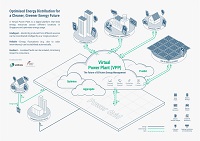For more information, please refer to:
Singapore, 29 April 2010 – The National Environment Agency (NEA), Energy Market Authority (EMA) and Economic Development Board (EDB) of Singapore launched the Energy Efficiency National Partnership (EENP) programme today, under the auspices of the Energy Efficiency Programme Office (E2PO).
The EENP is a significant milestone in E2PO’s drive to improve energy efficiency and save on energy costs in the industry sector, which accounts for 60 per cent of Singapore’s total energy consumption, with the more energy intensive sub-sectors like petroleum refining, petrochemicals, electronics and pharmaceuticals.
It is a voluntary programme that seeks to help companies put in place energy productivity improvement projects at the organisational level to reduce energy wastage. To date, 49 companies have agreed to participate in the EENP programme as Founding Partners, including 3M Singapore, GlaxoSmithKline, Pfizer Asia Pacific, and Shell Eastern Petroleum (refer to Annex A for the full list of Founding Partners).
“With the launch of EENP, we hope to inspire more companies to come forward and take the initiative to improve energy efficiency in their operations. By conserving the use of energy and thereby reducing their costs, they can enhance their long term business competitiveness and improve their bottom line. Their actions will also contribute towards the target of 35 per cent energy intensity improvement in the Sustainable Singapore Blueprint," said Mr Andrew Tan, Chief Executive Officer, NEA.
"By fostering a culture of sustained energy efficiency improvement, we want to also prepare companies for the Energy Conservation Act that we will be introducing in 2013.
We welcome the companies who have joined the EENP as Founding Partners and look forward to seeing more organisations come on-board," added Mr Tan.
As EENP partners, companies can look forward to preferential rates for EENP learning events and benefit from NEA’s various energy efficiency incentive schemes, including the Energy Efficiency Improvement Assistance Scheme and the Grant for Energy Efficient Technologies, to support their energy efficiency initiatives. EENP partners will also be provided with more opportunities to network and participate in benchmarking studies with peers, technical workshops and seminars. There will also be a recognition scheme held annually for companies that have implemented excellent energy management practices and achieved substantial savings as a result.
EENP Partners will be expected to work towards the adoption of an Energy Management System, where each company will appoint an energy manager, establish objectives and targets, develop energy policies and implement energy efficiency projects to meet these targets. Partners are also encouraged to share among themselves energy goals as well as performance indicators for their energy efficient improvement plans and projects, so as to promote best practices.
“For many manufacturing companies in Singapore, especially those from energy intensive industries such as semiconductors, chemicals and data centres, energy is a significant business cost. Energy efficiency is an important and cost-effective strategy that companies can adopt to address the challenges of high energy costs and climate change. The Energy Efficiency National Partnership provides a platform to help companies continuously improve energy usage, lower business costs and reduce their carbon footprint,” said Ms Anna Chan, Assistant Managing Director (Planning & Policy), EDB.
Agreeing, Mr Lawrence Wong, Chief Executive of EMA said, "The industry sector is a major consumer of energy. Energy efficiency in this sector will provide win-win situations for both businesses and Singapore. Using less energy to produce the same output or more will help reduce business costs, lower Singapore’s energy intensity and enhance our energy security. This partnership programme will provide an important platform for companies to strive towards greater competitiveness and sustainable growth."
For more information on the EENP, please refer to www.e2singapore.gov.sg
Singapore Certified Energy Managers (SCEM)
Along with the official launch of the EENP, we will be inaugurating the certification of the pioneer batch of 23 candidates in the Singapore Certified Energy Managers (SCEM) programme. Through the SCEM programme, the 23 graduates have acquired a suite of skills in energy efficiency to enable them to implement energy management practices and better manage energy use in their organisations and the buildings they occupy.
NEA launched the SCEM Training Grant in 2008 to incentivise the development of local expertise and capability in professional energy management. The SCEM Training Grant covers about 80 per cent of the training cost of the SCEM course. As at end-March 2009, NEA has approved 330 SCEM Training Grant applications from 193 companies.
Under the Energy Conservation Act to be introduced in 2013, minimum energy management standards will be introduced for large energy users in the industry sector. This includes the appointment of energy managers, reporting of energy use, and submission of energy efficiency improvement plans.















